| Green Delight in Estates - Making Public Rental Housing a Greener Living Place | ||
| Redevelopment of Kwai Chung Estate - Practicing Sustainable Development |

Green Delight in Estates -
Making Public Rental Housing a Greener Living Place
With around two million people living in Public Rental Housing (PRH), we recognise the significant contributions PRH tenants can make to protect the environment. As such, in mid-2005, the Housing Authority (HA) partnered with the Conservancy Association, Friends of the Earth (HK) and Green Power to launch the long-term community environmental programme "Green Delight in Estates".
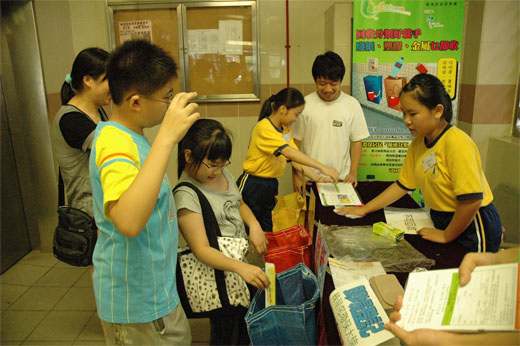 |
Face-to-face Promotion Educating Residents in Waste Separation – Sun Chui |
The programme aimed to raise the environmental awareness of PRH residents and instill a culture of protecting and improving the environment. Comprised of two parts, it rolled out in phases to ultimately cover all PRH estates. The first part of the programme was a territory-wide campaign with a main environmental theme, whereas the second part contained educational and promotional environmental programmes designed by green groups for individual estates.
In the first two phases, the theme of the programme's first part focused on waste reduction and recycling in PRH estates. Recycling days were held in different estates to encourage tenants to practice waste separation and recycle unwanted household items. To foster environmental awareness among residents, green groups recruited and trained 300 young PRH tenants to become "Green Ambassadors", to help spread green messages in the community during each programme phase.
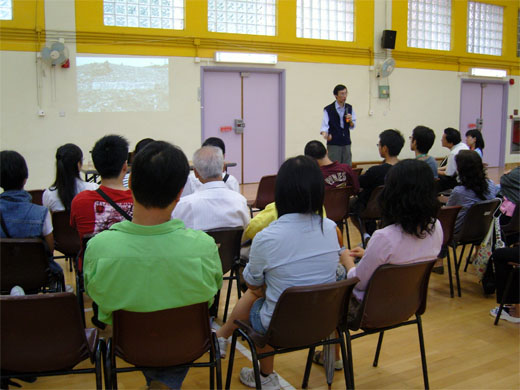 |
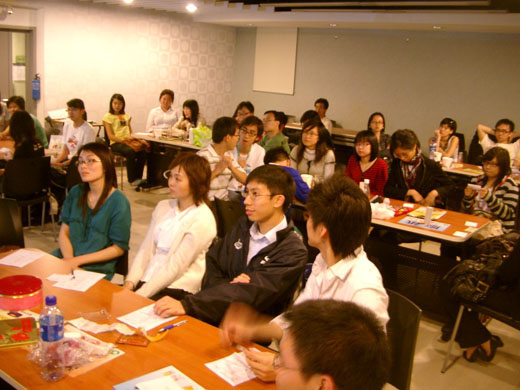 |
| Briefing to the Estates Management Advisory Committee Members |
Volunteer Leader Training Workshop |
The second part was a long-term self sustaining programme to enhance community cohesion and establish a green culture in PRH estates. Starting in 2005, 30 PRH estates were selected to participate in each phase of the programme. Each of the green groups carried out unique educational and promotional programmes in 10 selected PRH estates that focused on special themes, such as waste reduction/recycling, waste separation at the source, estate greening, reducing the use of plastic bags, building up green infrastructure, promoting green practices, etc. To sustain a longer-term environmental commitment among residents, green groups will recruit and train a volunteer core group from each participating estate. The group will eventually take over the programme and become trainers to convey environmental knowledge and guide other residents toward a green lifestyle.
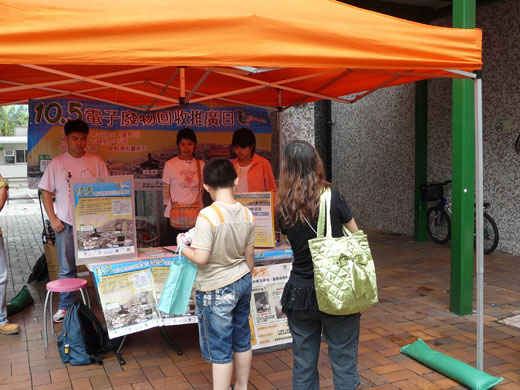 |
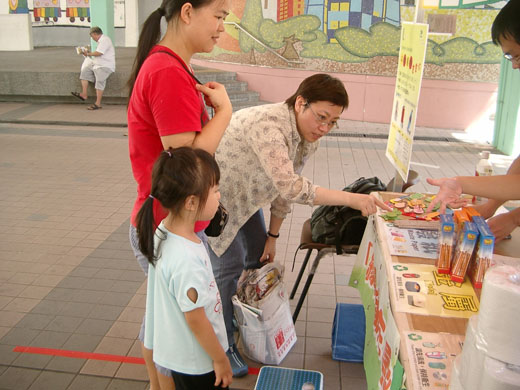 |
| Electronic Waste Recycling Day | Exchange Square |
According to a survey conducted by the Chinese University of Hong Kong, the environmental awareness of PRH tenants has risen continuously over the past two years. Over 73% of the tenants said they were more knowledgeable about environmental issues after participating in the programme, an increase of 6% from a year ago. About 70% of the respondents practiced separation of domestic waste at the source, while 65% used recycle bags. These figures are over 10% higher than two years ago.
The programme is currently in its third phase and a total of 90 PRH estates have participated in the programme. The theme of this year's programme was "Action Blue Sky". In collaboration with green groups, we launched territory-wide energy-saving activities in all PRH estates to encourage estate management staff and tenants to practice energy-saving measures. Each of the three green groups designed in-depth education activities for 30 selected PRH estates to strengthen tenants awareness of environmental protection and energy-saving. Residents from each participating estate have been trained to assist in programme implementation.
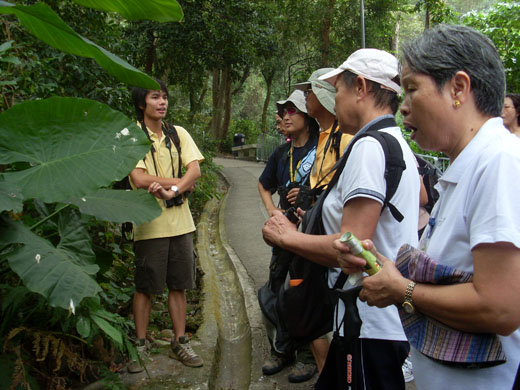 |
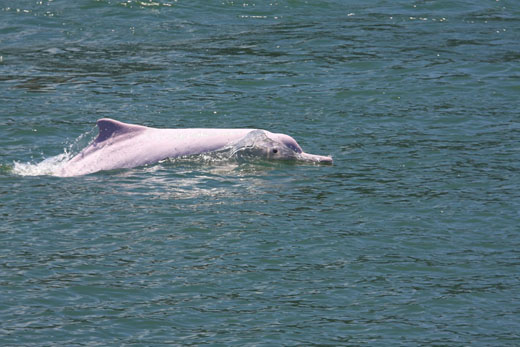 |
| Eco-visit to Lung Fu Shan | Dolphin Watch |
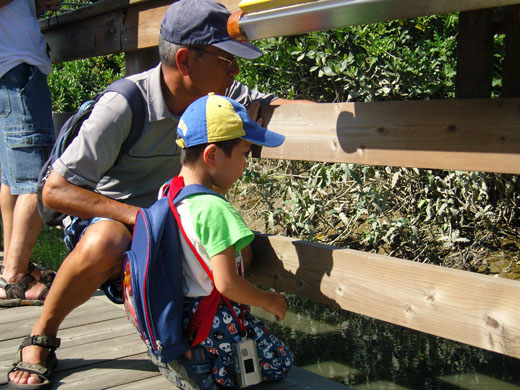 |
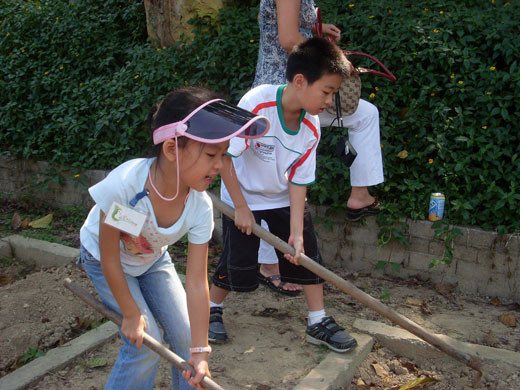 |
| Eco-tour to Wetland Park | Organic Farm |
Redevelopment of Kwai Chung Estate -
Practicing Sustainable Development
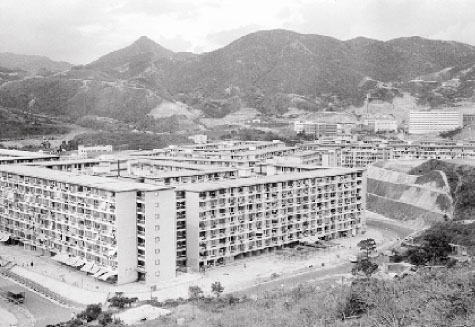 |
Old Kwai Chung Estate before Redevelopment
|
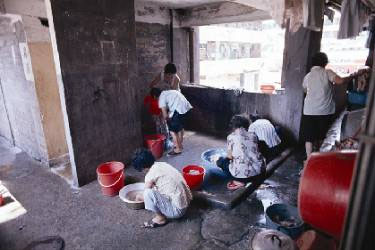 |
| Communal Washing Area in Old Kwai Chung Estate |
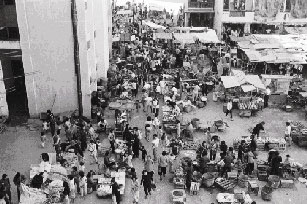 |
| Market Bazaar in Old Kwai Chung Estate |
Built in 1960s, Kwai Chung Estate was one of the earliest "Resettlement" Estates in Hong Kong. It was established when the population was increasing and at the time period when there was a shortage of safe and secure housing available.
By the late 1980s, it was learnt that the non self-contained type housing design provided in Kwai Chung Estate and the supporting facilities were unmatched with the expectations of residents. In this regard, Kwai Chung Estate was identified for redevelopment under the Housing Authority (HA)'s Comprehensive Redevelopment Programme in 1990s. The redevelopment project covers 11 hectares of site areas, providing a total of 14 500 improved accommodations as well as improvement works for supporting facilities within the Estate.
To achieve sustainable development, social, environmental and economical considerations were embraced during the implementation of this redevelopment project.
Social consideration was one of the key elements to be taken during the redevelopment of Kwai Chung Estate, of which the aim is to minimise social disruption to the residents and provide quality and comfortable living environment. A Comprehensive Redevelopment Programme (CRP) was implemented during the redevelopment project, in which residents affected by the redevelopment could apply, if necessary, for rehousing in new or refurbished public housing flats reserved for that particular phase of redevelopment.
To further minimise the disturbance to the local community, some of the essential components of the community such as car parks, markets, youth centre, schools and religious shrines were maintained.
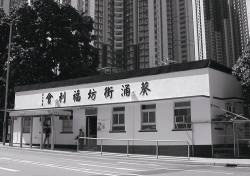 |
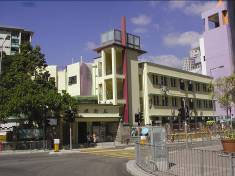 |
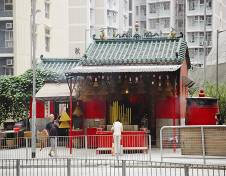 |
| Kai Fong Association (Neighbourhood Community Association) | Existing Youth Centre | Existing Religious Shrine |
| The design and establishment of a "civic hub" during the redevelopment of Kwai Chung Estate provides a focal point for residents to meet and socialise. This civic hub gives great convenience to the public. It comprises a 3-storey commercial centre, air-conditioned market with stall area, car-parking spaces, and a covered public transport interchange etc. | 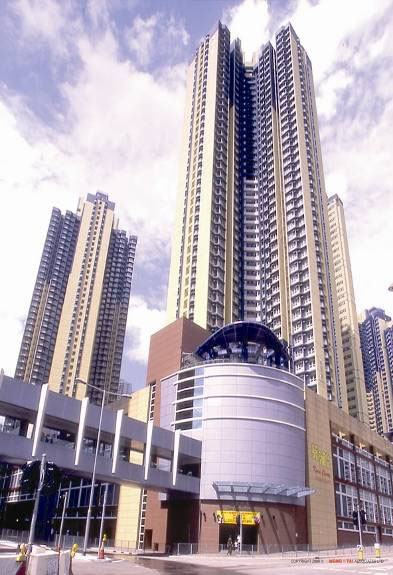 |
|
 |
||
| Elevations of the Commercial Podium | Commercial Centre | |
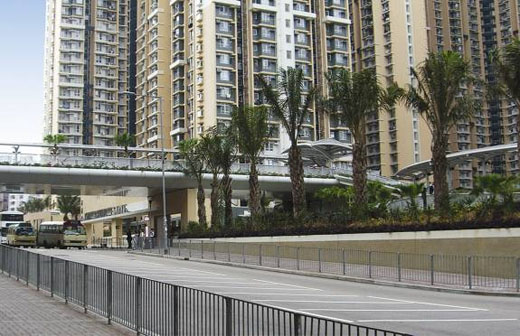 |
| New Road Network and Footbridge |
The HA continuously took economic considerations in optimising site development potentials during the redevelopment in order to cater for the increasing demand of flats in the late 1990s. At the time of redevelopment, the HA was able to optimise the site potentials by increasing the domestic gross area, which resulted in an increase in the number of new flats from 8 850 to 14 543.
During the estate redevelopment, environmental considerations were also taken in order to provide a green and healthy living environment for the residents. The overall area of open space within the estate has been increased from about 4.8ha to 7.5ha. Selected sites have been specifically designed to allow best possible use of open spaces for residents of the district. The redevelopment works also led to a plantation of 170 000 new plants and retention of 100 old trees in the Estate. About 30% of the estate area has been landscaped.
 |
| Landscape Open Spaces |
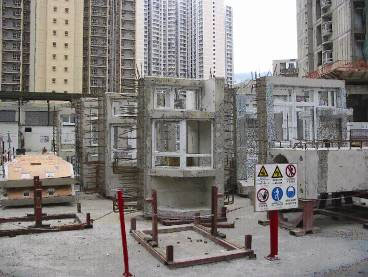 |
| Precast Element Storage Yard |
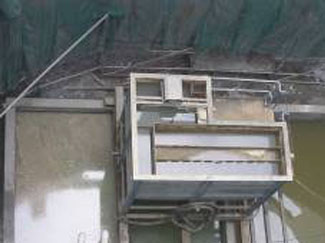 |
| Wastewater Treatment System |
New construction technologies were also employed during the redevelopment of Kwai Chung Estate, while modular design concepts and prefabricated construction techniques were widely adopted in order to increase work efficiencies and avoid wastage.
Furthermore, during the construction period various innovative environmental measures were specifically applied in construction sites. Examples of these measures included provision of on-site wastewater treatment systems to ensure compliance of discharge, establishment of health and education programme to control mosquito breeding etc.
During the course of redevelopment, the HA was able to achieve high quality and standard of work. With continuous efforts of project management and supports from the building contractors and subcontractors, over 30 awards on safety, environmental and construction management were issued to various projects during the construction period. In 2008, our project at Phases 3, 4 and 5 redevelopment sites received a merit award under the residential category of the Quality Building Award (QBA) 2008.
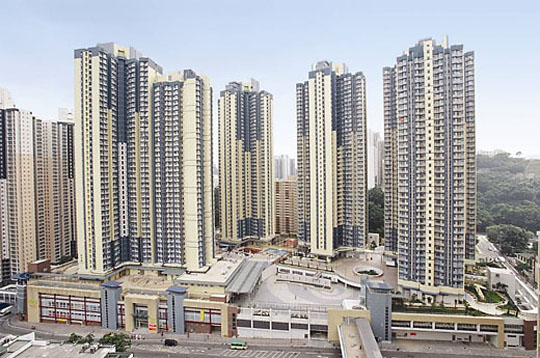 |
| Residential blocks on the Podium in Kwai Chung Estate Phase 3 and 4 |
 |
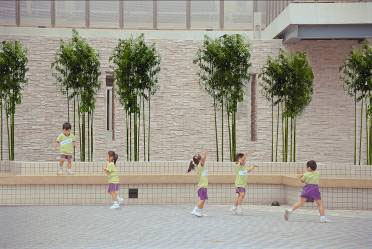 |
After 18 years of work and close attention to local interests, Kwai Chung Estate has been the largest CRP projects with homes for 40 000 people. The redevelopment has allowed for more effective land use and enhanced traffic flow in the area. Residents are now living in modern self-contained flats with a much improved Estate environment, a high standard of landscaping, and ample sitting out areas for the elderly and play facilities for children.
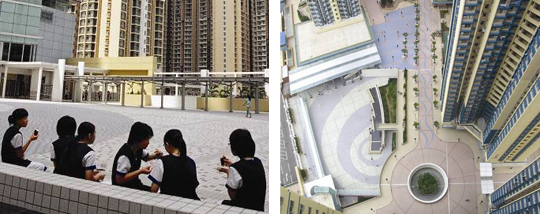 |
| Vicinity of Kwai Chung Estate |